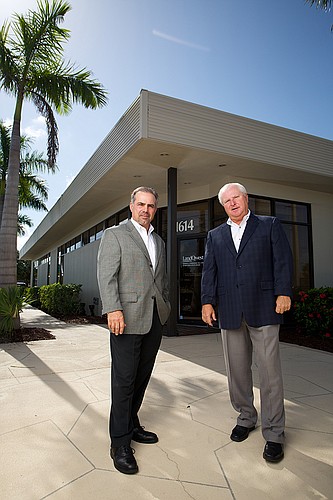- November 26, 2024
-
-
Loading

Loading

In late 2007, the principals of LandQwest Commercial realized the downturn would be more severe than many forecasted at the time.
They were among the first commercial real estate brokerages to launch an “asset recovery” division to help banks manage distressed loans to developers and builders.
It was a prescient move that helped the Fort Myers-based firm founded in 2006 build its listings to more than 300 today and manage 1.5 million square feet of commercial space from Orlando to Tampa and Fort Myers. Last year, the firm handled $90 million in sales and 243 leasing and sales transactions.
Now, LandQwest appears to be making another far-sighted move by offering customers property-tax-appeal services. LandQwest has teamed up with the former in-house attorney for the Lee County property appraiser, Mike Hagen, to offer appeals of higher-than-justified property valuations. Hagen started his own property valuation firm in 2003 called TaxCuts1.
Stephen Cunningham, principal with LandQwest, has seen this before because he performed appraisals for the Resolution Trust Corp. in the last commercial real estate bust after the savings-and-loan crisis of the late 1980s. “The collapse of the S&Ls was similar to this,” he says.
In a recovery, he says, county property appraisers tend to be more aggressive with valuations as the pressure builds to generate tax revenues. “There's a perception that the market has recovered more than it has,” Cunningham says.
But he cautions that the recovery remains uneven and some buildings may not be worth what the county property appraisers determine. For example, tenants in some shopping centers are still behind on their rent.
And county property appraisers have so many parcels to evaluate that they often rely on formulas that might not take into account factors that landlords can appeal. For example, there are more than 600,000 parcels in Lee County. “You can't be that accurate,” Cunningham says.
“If taxes go up, that affects tenants,” Cunningham says, potentially pushing up vacancies especially in buildings where taxes are passed directly through to the tenants in so-called “triple net” leases. As a result, he says, “you might see tenant loss.”
LandQwest earns 30% to 40% of the first-year tax savings if it's successful on appeal of a commercial property valuation. Hagen will handle most of the residential properties, while Cunningham will focus on larger commercial real estate parcels.
Cunningham has seen these cycles before. “I was doing appraisals in '79 when interest rates were 20%,” he says. Cunningham, with partners John Mounce and Rokki Rogan, were ahead of the curve when they established their asset recovery division in late 2007, a year after they started the firm. “We created that business in response to what was coming down the road,” Cunningham says.
Banks didn't realize they had deep problems until 2008. Indeed, the financial crisis on Wall Street didn't unfold until the fall of that year. “Most of the workers in the banks didn't know what foreclosures were,” says Cunningham.
But once the commercial real estate foreclosures got started, LandQwest won contracts to manage the properties, lease them up and sell them. That helped the firm grow during the downturn. “We came in at the right time,” Cunningham says.
Follow Jean Gruss on Twitter @JeanGruss